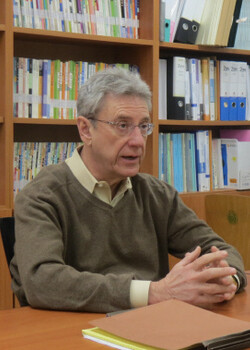hankyoreh
Links to other country sites 다른 나라 사이트 링크
Koreans’ unhappiness is related to instability

By Lee Chang-gon, Director of the Hankyoreh Social Policy Institute
“One of the main reasons why Koreans are not happy is because of their instability. If the President understands the importance of the citizens’ ‘pursuit of happiness’, she should create social systems that would bring stability to the people’s lives. That is an essential part of happiness”.
These are the words of Arne L. Kalleberg, Professor at the University of North Carolina. Kalleberg, a world-renowned sociologist, is esteemed for his theses and books on topics such as inequality, temporary jobs, and labor instability.
Kelleberg has identified labor instability as an important flaw in today’s capitalistic society and in his research he focuses on the association between inequality, labor instability, and social welfare. He is now doing research into Asia‘s labor instability with scholars from different countries, including Shin Gwang-young, Professor at Chung-Ang University in Seoul.
Kalleberg said, “After the 1980s, many countries had grow economic growth and progress, but their levels of poverty didn’t decrease that much. If anything, inequality and long-term unemployment have increased, which is counterintuitive to economic growth”. Kalleberg attributes this to, “structural change in the economic and political system that brought inequality into the labor market along with a dual structure phenomenon”.
Indeed, neo-liberalism quickly affected political and economic choices, including in the labor market. This led to divisions in areas such as employment, wages, and welfare between laborers at certain companies who enjoy various benefits (insiders), and those who couldn’t, including minorities, women and manufacturing workers (outsiders). The dualization of the labor market also brought the dualization of the welfare system.
Kalleberg also said, “In Asian countries such as Korea and Japan, labor instability has rapidly increased”. This dualization has also created an important political change. Kalleberg said, “Insiders who have a lot want to maintain their status and are mostly conservative, while outsiders want expanded welfare and protection. This leads them to be progressive, wanting drastic change and support from the government”. In order to improve these problems Kalleberg emphasized that, “Increasing stability though expansion of social welfare is important. Some think that it is important to guarantee stable employment with fewer layoffs, but that will cause businesses to relocate abroad. It is important to solve the problems of employment instability through measures such as retraining the unemployed”.
“While researching labor instability, I naturally came to look into quality of life and happiness and identified three major areas for a happy society: first, inequality should be decreased. Second, quality of life should be increased. Third, stability should be guaranteed”.
Translated by Kim Kyung-min, Hankyoreh English intern
Please direct questions or comments to [english@hani.co.kr]

Editorial・opinion
![[Guest essay] Amending the Constitution is Yoon’s key to leaving office in public’s good graces [Guest essay] Amending the Constitution is Yoon’s key to leaving office in public’s good graces](https://flexible.img.hani.co.kr/flexible/normal/500/300/imgdb/original/2024/0416/8917132552387962.jpg) [Guest essay] Amending the Constitution is Yoon’s key to leaving office in public’s good graces
[Guest essay] Amending the Constitution is Yoon’s key to leaving office in public’s good graces![[Editorial] 10 years on, lessons of Sewol tragedy must never be forgotten [Editorial] 10 years on, lessons of Sewol tragedy must never be forgotten](https://flexible.img.hani.co.kr/flexible/normal/500/300/imgdb/original/2024/0416/8317132536568958.jpg) [Editorial] 10 years on, lessons of Sewol tragedy must never be forgotten
[Editorial] 10 years on, lessons of Sewol tragedy must never be forgotten- [Column] A death blow to Korea’s prosecutor politics
- [Correspondent’s column] The US and the end of Japanese pacifism
- [Guest essay] How Korea turned its trainee doctors into monsters
- [Guest essay] As someone who helped forge Seoul-Moscow ties, their status today troubles me
- [Editorial] Koreans sent a loud and clear message to Yoon
- [Column] In Korea’s midterm elections, it’s time for accountability
- [Guest essay] At only 26, I’ve seen 4 wars in my home of Gaza
- [Column] Syngman Rhee’s bloody legacy in Jeju
Most viewed articles
- 1[Guest essay] Amending the Constitution is Yoon’s key to leaving office in public’s good graces
- 2Faith in the power of memory: Why these teens carry yellow ribbons for Sewol
- 3[Editorial] 10 years on, lessons of Sewol tragedy must never be forgotten
- 4[Guest essay] How Korea turned its trainee doctors into monsters
- 5How Samsung’s promises of cutting-edge tech won US semiconductor grants on par with TSMC
- 6US grants Samsung up to $6.4B in subsidies for its chip investments there
- 7[News analysis] Watershed augmentation of US-Japan alliance to put Korea’s diplomacy to the test
- 8Korea ranks among 10 countries going backward on coal power, report shows
- 9[Column] A death blow to Korea’s prosecutor politics
- 10K-pop a major contributor to boom in physical album sales worldwide, says IFPI analyst